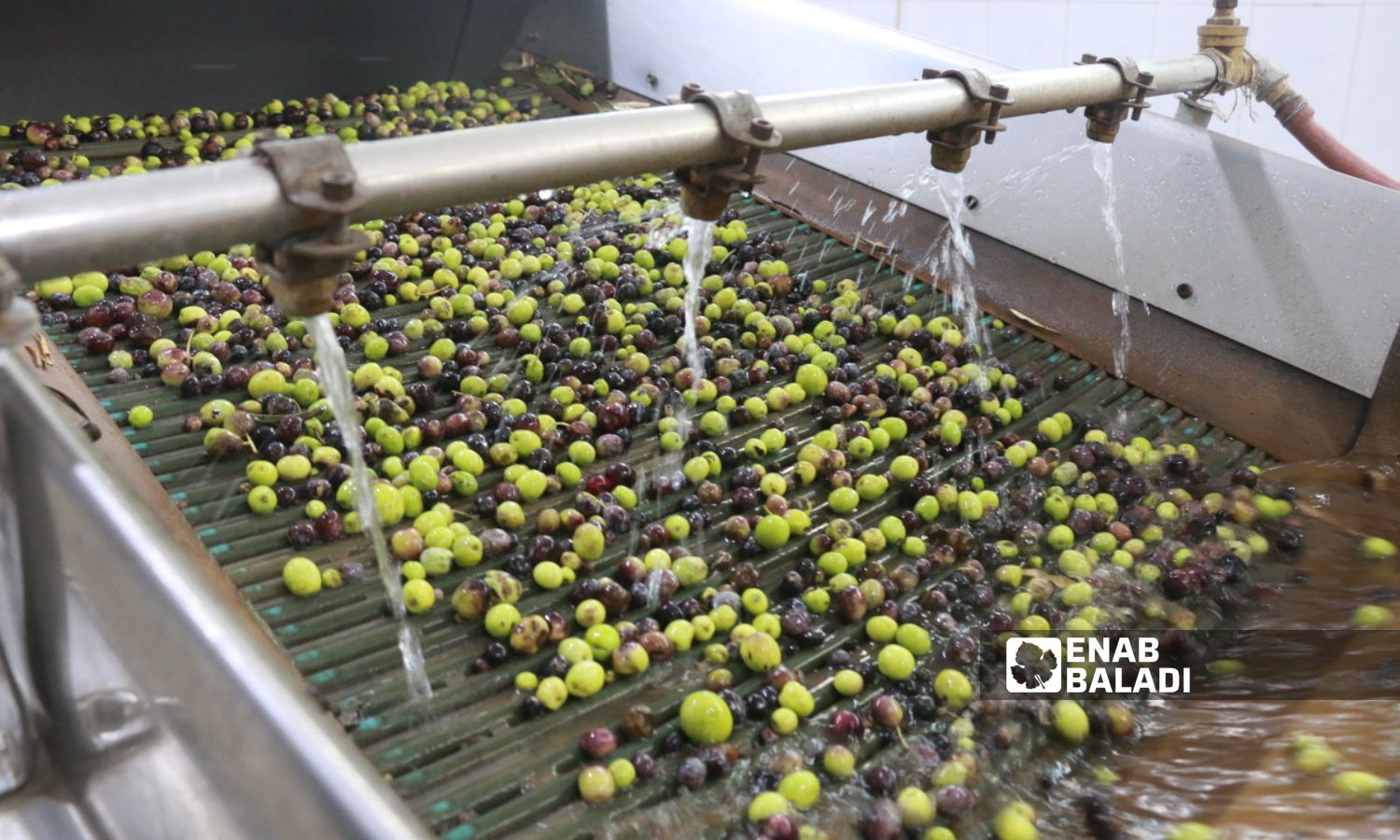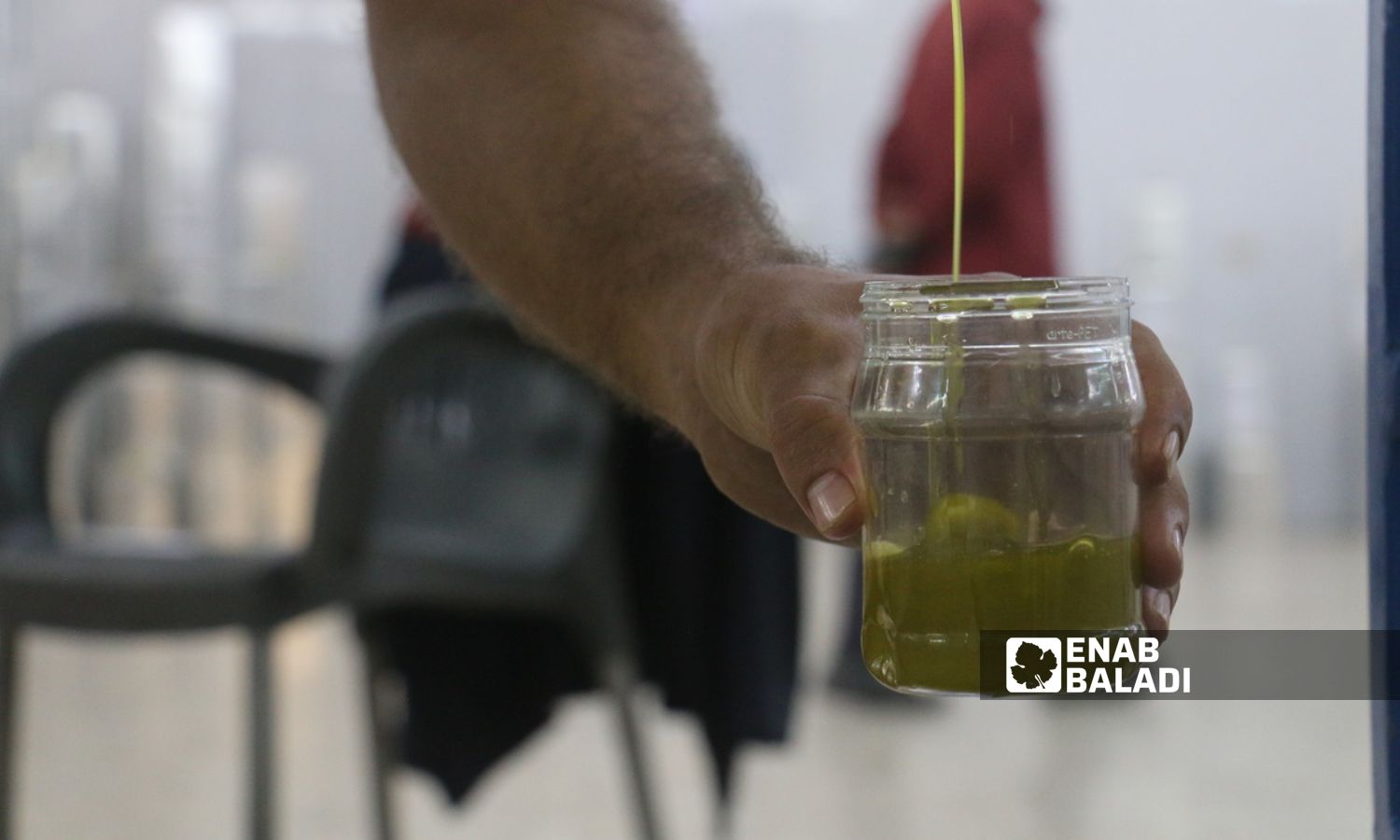



Aleppo countryside – Dayan Junpaz
Olive picking season began early this year in northwestern Syria amid a drop in this season’s oil production due to weather fluctuations, alternate bearing, and the lack of marketing outlets.
Similar issues are faced in most regions of Syria, but in the northern and eastern rural areas of Aleppo, where the Turkey-backed Syrian Interim Government (SIG) is in control, there is an added problem of theft under the pretext of “collecting falling olives from the ground or from trees that were harvested.”
Mohammed Jamal, a farmer from the city of Azaz in the northern Aleppo countryside, owns 800 olive trees on the outskirts of the city. He told Enab Baladi that he harvested the fruits from his trees early this season, in early October, due to thefts resulting from “collecting falling olives,” which greatly affected his yield.
He mentioned that he was expecting to harvest ten bags (each bag weighing 100 kilograms) from a piece of land containing 120 trees. However, he discovered that the majority of the olives were stolen from the trees, and only two bags of olives were produced. He also noted that the heat had an impact and resulted in the drying out of the olives.
Hassan Ibrahim, another farmer from Azaz, had to harvest his trees at an early stage in order to avoid losses due to the increasing cases of olive theft under the pretext of “collecting falling olives.” He told Enab Baladi that he picked the olives before their natural ripening period.
Hassan Dawood, another farmer in rural Azaz who owns more than 100 olive trees, stated to Enab Baladi that olive oil production has significantly declined this year. He mentioned that last season, each bag of olives produced between 20 and 24 kilograms of oil.
He added that the production this season has decreased to approximately 16 kilograms of oil per bag of olives. He attributed this decline to the incomplete ripening of the fruits since he harvested the olives early out of fear of theft and to avoid what happened to other farmers he knows. This has affected the quality and quantity of the extracted oil.
Harvesting olives requires labor, and the wage for a harvesting worker is 80 Turkish liras per day or according to the number of hours worked. The hourly wage is ten Turkish liras per worker.

Olive oil inside a press in Aleppo countryside, northern Syria – November 2023 (Enab Baladi/Dayan Junpaz)
Farmers in rural Aleppo face difficulties in exporting olive oil abroad through border crossings with Turkey. Most of the time, the harvest is sold locally or through intermediaries and merchants who export it.
Ahmed Hassano, a supervisor at an olive press in the city of Azaz, stated to Enab Baladi that the olive oil is exclusively sold inside the press. The press sells its quantities to local merchants who sell it in local markets or export it abroad.
Hassano explained that exporting the oil is a challenging process due to complexities and procedures involved in the export process and dealing with traders outside of Syria.
Regarding the fees for the press, Hassano mentioned that they amount to about 7 or 8% of the amount of oil pressed (about one-tenth of the original amount). Additionally, the press extracts a substance called “pomace,” which is used as fuel by the press owners.
The director of agriculture in Aleppo in the Interim Government, Hassan al-Hassan, told Enab Baladi that the number of trees in Afrin and its countryside ranges between 10 million and 14 million trees, while in Azaz, al-Bab and Jarablus, there are four million trees.
There are no preliminary estimates for the quantity of olive production this year, as the agricultural season has not yet been completed, according to al-Hassan.
The incidents of crop theft are added to previous problems, as military factions affiliated with the Syrian National Army (SNA) impose taxes that vary from one area to another, affecting farmers’ livelihoods and the confiscation of their properties for the past four years. Despite the existence of institutions and accountability committees, concerns prevail amid a state of “security chaos” in the region.
The taxes imposed on the lands varied depending on the region and the faction in control. Some factions even imposed taxes on each stage of the harvest, including pressing the olives. Some of them imposed taxes based on the number of trees.
Prior to the start of the olive harvest season, the ministry of defense in the Interim Government requested its formations in rural Aleppo to provide facilities for farmers to harvest the olives and not impose any taxes. This was an attempt to curb the violations that occurred during previous years.
According to a circular issued by the ministry, “it is strictly prohibited to collect any in-kind or cash taxes from the olive crop farmers under any name,” and it requested all factions to ensure the “livelihoods of citizens” and to facilitate the harvest and transportation of the crop freely.
if you think the article contain wrong information or you have additional details Send Correction